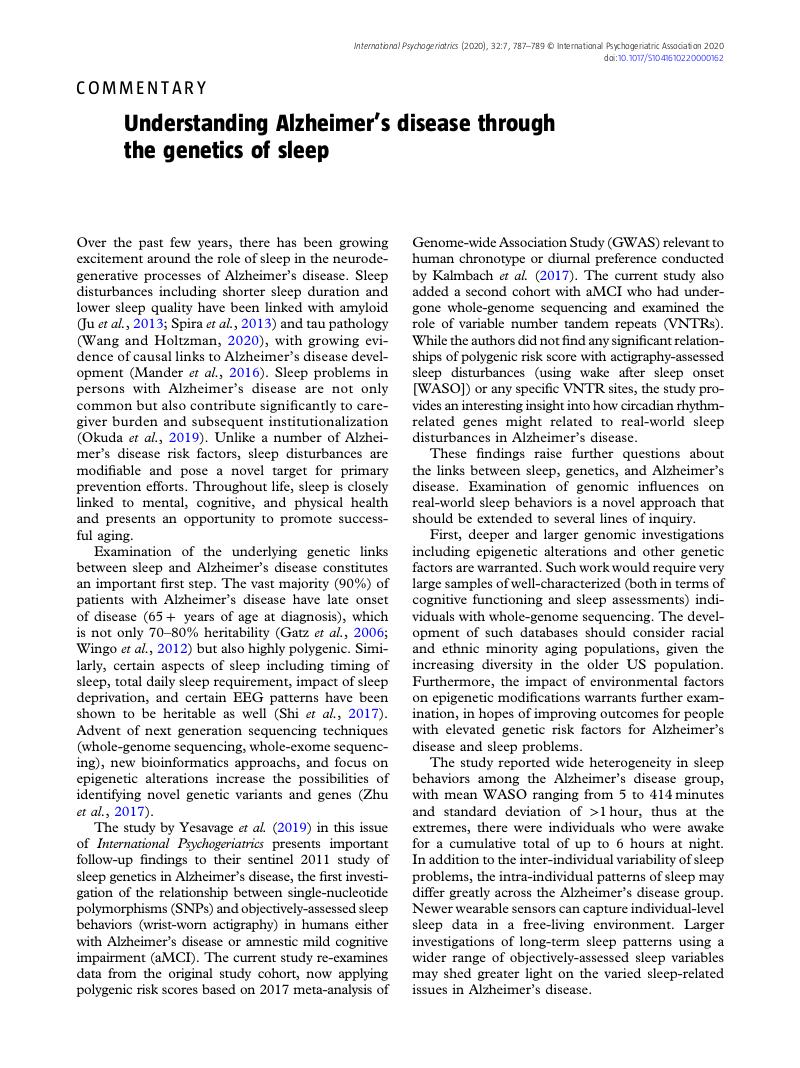No CrossRef data available.
Article contents
Understanding Alzheimer’s disease through the genetics of sleep
Published online by Cambridge University Press: 03 August 2020
Abstract
An abstract is not available for this content so a preview has been provided. Please use the Get access link above for information on how to access this content.

- Type
- Commentary
- Information
- International Psychogeriatrics , Volume 32 , Issue 7: Issue Theme: Sleep and Sleep Disorders in Older Adults , July 2020 , pp. 787 - 789
- Copyright
- © International Psychogeriatric Association 2020
References
Baglioni, C.et al. (2016). Sleep and mental disorders: a meta-analysis of polysomnographic research. Psychological Bulletin, 142, 969–990. doi: 10.1037/bul0000053.CrossRefGoogle ScholarPubMed
Gatz, M.et al. (2006). Role of genes and environments for explaining Alzheimer disease. Archives of General Psychiatry, 63, 168–174. doi: 10.1001/archpsyc.63.2.168.CrossRefGoogle ScholarPubMed
Ju, Y.E.et al. (2013). Sleep quality and preclinical Alzheimer disease. JAMA Neurology, 70, 587–593. doi: 10.1001/jamaneurol.2013.2334.CrossRefGoogle ScholarPubMed
Kalmbach, D.A.et al. (2017). Genetic basis of chronotype in humans: insights from three landmark GWAS. Sleep, 40, zsw048. doi: 10.1093/sleep/zsw048.CrossRefGoogle ScholarPubMed
Liguori, C.et al. (2017). Obstructive sleep apnea is associated with early but possibly modifiable Alzheimer’s disease biomarkers changes. Sleep, 40, zsx011. doi: 10.1093/sleep/zsx011.Google ScholarPubMed
Mander, B.A., Winer, J.R., Jagust, W.J. and Walker, M.P. (2016). Sleep: a novel mechanistic pathway, biomarker, and treatment target in the pathology of Alzheimer’s disease? Trends in Neurosciences, 39, 552–566. doi: 10.1016/j.tins.2016.05.002.CrossRefGoogle ScholarPubMed
Okuda, S., Tetsuka, J., Takahashi, K., Toda, Y., Kubo, T. and Tokita, S. (2019). Association between sleep disturbance in Alzheimer’s disease patients and burden on and health status of their caregivers. Journal of Neurology, 266, 1490–1500. doi: 10.1007/s00415-019-09286-0.CrossRefGoogle ScholarPubMed
Olaithe, M., Bucks, R.S., Hillman, D.R. and Eastwood, P.R. (2018). Cognitive deficits in obstructive sleep apnea: insights from a meta-review and comparison with deficits observed in COPD, insomnia, and sleep deprivation. Sleep Medicine Reviews, 38, 39–49. doi: 10.1016/j.smrv.2017.03.005.CrossRefGoogle ScholarPubMed
Robillard, R.et al. (2015). Ambulatory sleep–wake patterns and variability in young people with emerging mental disorders. Journal of Psychiatry & Neuroscience, 40, 28–37. doi: 10.1503/jpn.130247.CrossRefGoogle ScholarPubMed
Shi, G., Wu, D., Ptacek, L.J. and Fu, Y.H. (2017). Human genetics and sleep behavior. Current Opinion in Neurobiology, 44, 43–49. doi: 10.1016/j.conb.2017.02.015.CrossRefGoogle ScholarPubMed
Spira, A.P.et al. (2013). Self-reported sleep and beta-amyloid deposition in community-dwelling older adults. JAMA Neurology, 70, 1537–1543. doi: 10.1001/jamaneurol.2013.4258.Google ScholarPubMed
Wang, C. and Holtzman, D.M. (2020). Bidirectional relationship between sleep and Alzheimer’s disease: role of amyloid, tau, and other factors. Neuropsychopharmacology, 45, 104–120. doi: 10.1038/s41386-019-0478-5.CrossRefGoogle ScholarPubMed
Wingo, T.S., Lah, J.J., Levey, A.I. and Cutler, D.J. (2012). Autosomal recessive causes likely in early-onset Alzheimer disease. Archives of Neurology, 69, 59–64. doi: 10.1001/archneurol.2011.221.CrossRefGoogle ScholarPubMed
Yesavage, J. A.et al. (2019). Sleep-wake disorders in Alzheimer’s disease: further genetic analyses in relation to objective sleep measures. International Psychogeriatrics, 32, 807–813. doi: 10.1017/S1041610219001777.Google Scholar
Zhu, J.B., Tan, C.C., Tan, L. and Yu, J.T. (2017). State of play in Alzheimer’s disease genetics. Journal of Alzheimer’s Disease, 58, 631–659. doi: 10.3233/jad-170062.CrossRefGoogle ScholarPubMed


